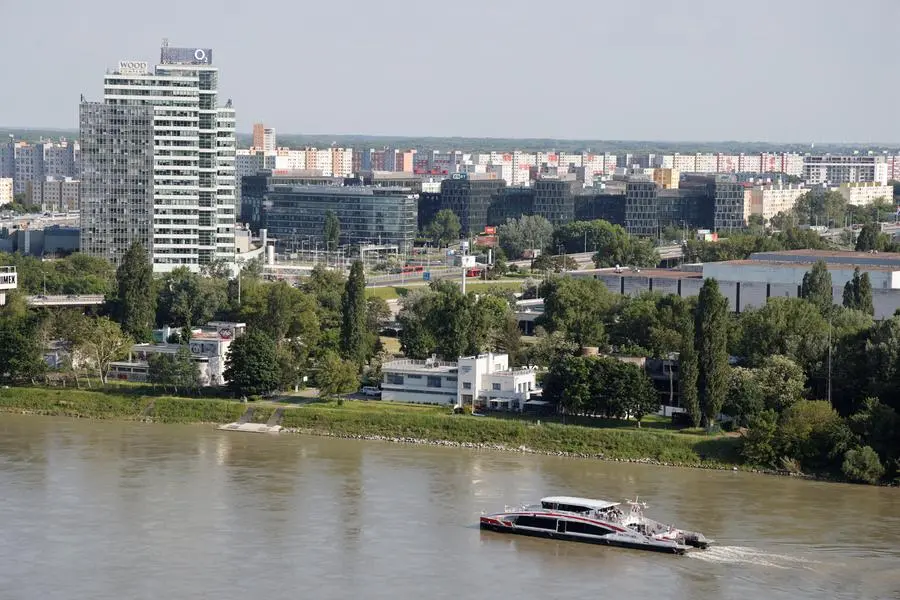PHOTO
Slovak voters are being flooded with disinformation from home and abroad ahead of Saturday's elections set to determine whether the country will change its foreign policy in Russia's favour.
The EU and NATO member of 5.4 million people has been under a barrage of online misinformation and disinformation for years, much of it coming from pro-Kremlin sources, analysts told AFP.
"The disinformation ecosystem in Slovakia... is reaching its zenith today" ahead of the vote, said Peter Duboczi, editor-in-chief at Infosecurity.sk.
He said Slovak politicians were the main disseminators and the vote would be the first in recent years "to reflect the full potential of disinformation".
Analysts point to three parties pushing false anti-Ukrainian and pro-Russian claims: the leftwing Smer-SD of former premier Robert Fico, the nationalist Republika and the Slovak National Party (SNS).
Fico is the favourite to become the new prime minister and both Republika and SNS are set to garner enough votes to gain parliamentary seats, according to polls.
Tomas Krissak, an analyst at Gerulata Technologies, a start-up focused on hybrid threats, said these parties "use political manipulation as a campaign tool".
Reset, a London-based nonprofit, said it had registered over 365,000 election-related disinformation items on Slovak social media in the first two weeks of September.
It said posts violating social media terms of service and containing disinformation had generated more than five times as much exposure as an average post.
More than 15 percent of such posts have originated from Pro-Kremlin accounts, Reset said in a report.
- 'Vote rigging' -
Even before the election, Fico and Republika chair Milan Uhrik have warned voters of potential vote rigging -- a strategy used by Donald Trump in his failed re-election bid for the US presidency in 2020.
Fico has also said the war in Ukraine had originated in 2014, with Ukrainian "fascists" killing Russian civilians.
Inaccurate and unproven, this claim is often used by the Kremlin and allied media outlets.
In a similar vein, SNS chairman Andrej Danko said in July that Russian-occupied territories were not "historically Ukrainian".
"These entities act as extended arms of Russian propaganda," Duboczi said.
Slovakia has also "witnessed a noticeable increase in the sexualisation of political mobilisation", said Victor Breiner, an independent analyst focused on hybrid threats.
"We have observed a significant rise in attempts to dehumanise the LGBTQ community," he said.
Fico recently mocked LGBTQ people in a campaign spot, musing whether his top opponent Michal Simecka, head of the liberal Progressive Slovakia party, would "identify as a boy, a girl or a helicopter".
Migrants from the Middle East, crossing the southern border with Hungary, are another popular campaign topic.
The rhetoric reached such a level that Slovak police chief Stefan Hamran urged politicians to refrain from migration-related disinformation because it was hampering police work.
- 'Political mobilisation' -
Slovakia is particularly prone to disinformation.
A 2022 survey by the Globsec think tank showed that 54 percent of Slovaks believed popular conspiracy theories such as that world affairs are decided by secret groups aiming to establish a totalitarian world order.
Propaganda aimed at Ukrainian President Volodymyr Zelensky has also taken root.
Only 31 percent of Slovaks perceive him as a positive figure, according to Globsec's 2023 survey.
AFP has debunked popular disinformation suggesting that Zelensky is a Nazi, corrupt or using drugs.
Analysts say some disinformation spread since the invasion of Ukraine can be directly attributed to Russia.
Krissak said the Russian embassy in Slovakia has been particularly active in promoting "a lot of disinformation and manipulative narratives".
Last September, Russian ambassador Igor Brachikov accused the mayor of an eastern village of having razed a cemetery of Russian World War I soldiers.
Analysts said that he was trying to shift attention from the discovery of a mass grave near the Ukrainian city of Izyum at that time, and that the Slovak cemetery was just undergoing maintenance.
"Russia has systematically built a complex network of media channels, influencers and public figures who have infiltrated public discourse and perform political mobilisation," Breiner said.





















